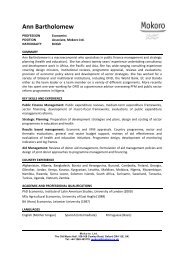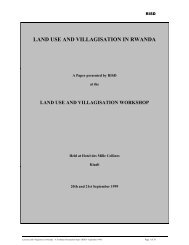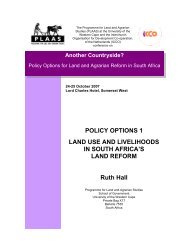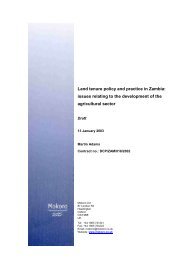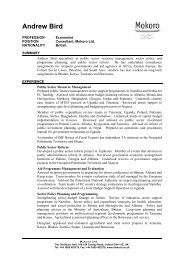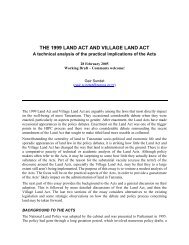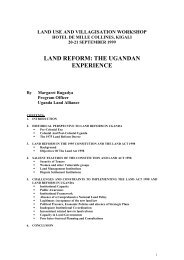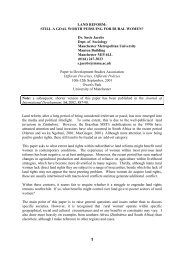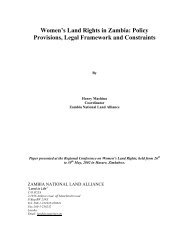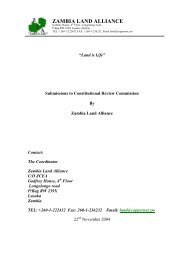Gender Issues and Best Practices in Land Administration ... - Mokoro
Gender Issues and Best Practices in Land Administration ... - Mokoro
Gender Issues and Best Practices in Land Administration ... - Mokoro
You also want an ePaper? Increase the reach of your titles
YUMPU automatically turns print PDFs into web optimized ePapers that Google loves.
TITLE: Guide to <strong>Gender</strong> <strong>Issues</strong> <strong>and</strong> <strong>Best</strong> <strong>Practices</strong> <strong>in</strong> L<strong>and</strong> Adm<strong>in</strong>istration Projectsthem), they can be lost.’ (p.6). Women may also lose rights to l<strong>and</strong>, even <strong>in</strong> communalsystems, when l<strong>and</strong> becomes more valuable. They cite Kaori Izumi as show<strong>in</strong>g how <strong>in</strong>Tanzania ‘widowed women who had previously been allowed to stay on their husb<strong>and</strong>s’ l<strong>and</strong>are now be<strong>in</strong>g dispossessed of that l<strong>and</strong> as it <strong>in</strong>creases <strong>in</strong> value’ (pp.6-7).3. Trust<strong>in</strong>g the customary?The report argues generally that ‘Customary <strong>in</strong>stitutions are often very important forenforc<strong>in</strong>g women’s l<strong>and</strong> rights or mak<strong>in</strong>g changes to long-held customary norms. They arelocal <strong>and</strong> therefore accessible, the leaders are generally respected by the community, <strong>and</strong>women are less ashamed to approach village leaders than to participate <strong>in</strong> a formal courthear<strong>in</strong>g.’ (p.13). Moreover ‘these traditional <strong>in</strong>stitutions can have more power to changecultural norms than do legislative bodies or modern <strong>in</strong>stitutions. Traditional leaders are ableto speak with authority for the whole community <strong>and</strong> can thereby <strong>in</strong>stitute fundamental,socially agreed change’ (p.14).This may well be true <strong>in</strong> many cases, but not of course <strong>in</strong> all, as the fierce debates <strong>in</strong> SouthAfrica around the Communal L<strong>and</strong> Rights Act testify, while, as Ann Whitehead <strong>and</strong> DzodziTsikata have po<strong>in</strong>ted out, 1 African women lawyers are much more equivocal about trust<strong>in</strong>gthe customary, preferr<strong>in</strong>g to look to the State for laws to protect women’s <strong>in</strong>terests. Theyargue that there are considerable problems with so-called customary systems of l<strong>and</strong> tenure<strong>and</strong> adm<strong>in</strong>istration for achiev<strong>in</strong>g gender justice with respect to women's l<strong>and</strong> claims <strong>in</strong> Africa<strong>and</strong> that <strong>in</strong>sufficient attention is be<strong>in</strong>g paid to power relations <strong>in</strong> the countryside <strong>and</strong> theirimplications for social groups, such as women, who are not well positioned <strong>and</strong> represented<strong>in</strong> local level power structures.4. <strong>Gender</strong> dimensions <strong>in</strong> l<strong>and</strong> adm<strong>in</strong>istration‘<strong>Issues</strong> <strong>in</strong> l<strong>and</strong> adm<strong>in</strong>istration reforms that have a gender dimension <strong>in</strong>clude:1. a lack of underst<strong>and</strong><strong>in</strong>g of the complexity <strong>and</strong> diversity of l<strong>and</strong> tenure patterns,<strong>in</strong>clud<strong>in</strong>g women’s rights, by most l<strong>and</strong> adm<strong>in</strong>istrators, by project managers, <strong>and</strong> bythose provid<strong>in</strong>g technical assistance;2. a belief that address<strong>in</strong>g gender issues only means issu<strong>in</strong>g titles or co-titles to women,with little appreciation, for <strong>in</strong>stance, for what happens (a) <strong>in</strong> subsequent transactions, (b)<strong>in</strong> enforcement <strong>and</strong> actualization of those rights, (c) <strong>in</strong> realiz<strong>in</strong>g the benefits that maystem from formaliz<strong>in</strong>g women’s rights (such as access to credit), <strong>and</strong> (d) <strong>in</strong> alter<strong>in</strong>gdecision-mak<strong>in</strong>g powers with<strong>in</strong> households;3. a belief that address<strong>in</strong>g gender issues with<strong>in</strong> l<strong>and</strong> adm<strong>in</strong>istration is ensur<strong>in</strong>g that womenare hired (for example, as clerks, <strong>in</strong>terpreters, social specialists), rather thanma<strong>in</strong>stream<strong>in</strong>g equal opportunities for all employees <strong>in</strong> all types of activities.’ (p.18)Important questions lead<strong>in</strong>g to a better underst<strong>and</strong><strong>in</strong>g of how best to identify <strong>and</strong> formalizewomen’s l<strong>and</strong> rights <strong>in</strong>clude: ‘Who has communal <strong>and</strong> who has <strong>in</strong>dividual rights to l<strong>and</strong>? What are the <strong>in</strong>heritance <strong>and</strong> marriage practices? How much of a role do consensual unions that are not formalized play with<strong>in</strong> the socialsystem? What are the variations between urban <strong>and</strong> rural areas?’ (pp.x-xi).1 Ann Whitehead <strong>and</strong> Dzodzi Tsikata, ‘Policy Discourses on Women’s L<strong>and</strong> Rights <strong>in</strong> Sub-Saharan Africa: TheImplications of the Re-turn to the Customary’, Journal of Agrarian Change, vol. 3, nos.1 <strong>and</strong> 2, January <strong>and</strong> April,2003, 67-112. http://www.oxfam.org.uk/resources/learn<strong>in</strong>g/l<strong>and</strong>rights/downloads/return.rtfAuthor/Dept: palmerCreated: 10-Mar-12. Last saved: 14/03/2012 13:10:00 Page 4 of 7D:\Documents\WEBSITE\Net\Africa general docs\wb_guide_gender_best_practices_l<strong>and</strong>_adm<strong>in</strong>.rtf



